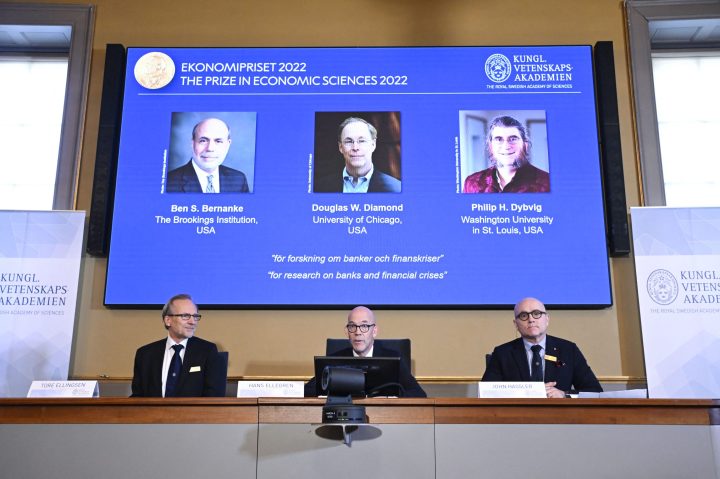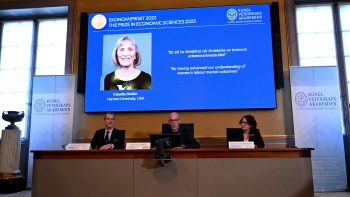
Nobel Prize in economics goes to trio focused on understanding, averting financial crises
Nobel Prize in economics goes to trio focused on understanding, averting financial crises

Three researchers have won the Nobel Prize in economics. They are former Fed Chair Ben Bernanke, Douglas Diamond of the University of Chicago and Philip Dybvig of Washington University in St. Louis.
Their work involves bank runs, the power of deposit insurance and “moral hazards,” when people take bigger risks because they know a bailout is coming. To help break some of this down, “Marketplace Morning Report’s” David Brancaccio spoke with senior economics contributor Chris Farrell. Below is an edited transcript of the conversation.
Chris Farrell: They studied things like the Great Depression and financial crises. And what the Nobel Committee is highlighting them for is that their research not only helped us understand financial crises, but the kind of regulation that prevents a recession from turning into another Great Depression.
David Brancaccio: It had been often remarked at the time of the 2008-2009 mess that Ben Bernanke, with his academic background, was perhaps the person you did want running our central bank during this time of crisis. But what was the deal in the 1920s? Bank runs, but then we had deposit insurance. So perhaps many other academics would be like, “Well, what’s more to study?”
Farrell: That’s right. And that’s one of the reasons why it sort of faded into the background. But, you know, if you look at banks, these are very complex institutions. They’re taking money from savers, they’re lending it out to borrowers. And trust is incredibly important. And it does turn out, in a modern economy, even with deposit insurance, you can have an equivalent of a bank run. And one of the things Douglas Diamond during the press conference said, you know, right now, the banks are really strong because of the regulations that were enacted after 2008-2009 and because of recent memories, but the fundamental problem when you’re taking in short-term deposits and you’re lending out long — that is something that many financial institutions can do — at a period of inflation, at a period of rising interest rates … you can’t relax, you need to be wary.
Brancaccio: Right, because what is a bank run? A bank run is worry on the part of too many depositors that the other guy’s going to take his or her money out, and that you better get in there first. And when that happens, it feeds on itself. And that’s what they are very interested in fully understanding.
Farrell: If you look what happened in Britain recently that you covered with the plunge in the gilts and British central bank having to come in and support that market, it was the equivalent of a market run on the gilts system.
Brancaccio: Right, those gilts: British government bonds spooked by the notion of a bunch of extra borrowing by the new British government. And that was really just a couple of weeks ago.
There’s a lot happening in the world. Through it all, Marketplace is here for you.
You rely on Marketplace to break down the world’s events and tell you how it affects you in a fact-based, approachable way. We rely on your financial support to keep making that possible.
Your donation today powers the independent journalism that you rely on. For just $5/month, you can help sustain Marketplace so we can keep reporting on the things that matter to you.
















